George Orwell Animal Farm

The Pleasure of Reading eliGreenwich STAGE 2 B1.1 PREPARING FOR PRELIMINARY FLIP BOOK + AUDIO MP3
Welcome to Animal Farm
Information about the author, the story and the historical period.

Brief descriptions of the main characters.
The text with cultural details, brief summaries and glossary.






Pre-reading activities.
A wide variety of activities covering Cambridge Exam Certificates, State exams, 21st Century Skills and 2030 Agenda topics.
A final test to check what you remember.
A transcript of one of the most important scenes from the story to act out together in class.
George Orwell Animal Farm
Retold by Silvana Sardi
eliGreenwich
Illustrated by Andrea Rivola
Costituzione e Cittadinanza
Sir Arthur Conan Doyle The Sign of the Four
E. Gaskell, K. Chopin, K. Mansfield, V. Woolf, E.Wharton Portraits of Women
Robert
Louis Stevenson The Strange Case of Dr Jekyll and Mr Hyde
Geoffrey Chaucer The Canterbury Tales
Jane Austen Pride and Prejudice
Lewis Carroll Alice in Wonderland
Oscar Wilde The Canterville Ghost
H.G. Wells, G. Orwell, E.A. Poe, S.O. Jewett, V. Woolf One Planet, One Goal
Mary Shelley Frankenstein
George Orwell Animal Farm
K. Mansfield, J. Joyce, O. Wilde, R. Tagore, M. Twain Tales of Friendship
Charlotte Brontë Jane Eyre
Oscar Wilde The Picture of Dorian Gray
H.G. Wells The Time Machine
Series Editors Paola Accattoli, Grazia Ancillani
Art Director Daniele Garbuglia
Graphic Design Emilia Coari
Production Manager Francesco Capitano
Photo Credits Shutterstock, Alamy
© 2023 ELi, Gruppo editoriale ELi
Printed in Italy by Tecnostampa - Pigini Group Printing Division, Loreto-Trevi
23.83.263.0
ENG012-01
ISBN 978-88-536-3976-9
www.gruppoeli.it
Esame di Stato
Drama
Legenda INVALSI
Glossario
21st Century Skills Agenda 2030
PRELIMINARY
6 Dossier 1 George Orwell 10 Characters 12 Pre-reading Activities 16 Chapter 1 Old Major 22 Activities 26 Chapter 2 The Rebellion 32 Activities 36 Chapter 3 The Battle of the Cowshed 42 Activities 46 Dossier 2 Before the Russian Revolution 50 Chapter 4 The Windmill 56 Activities 60 Chapter 5 Traitors 66 Activities 70 Chapter 6 Our Leader, Comrade Napoleon 76 Activities 80 Dossier 3 The Russian Revolution 84 Chapter 7 Boxer 90 Activities 94 Chapter 8 Manor Farm 100 Activities 104 Final Test 110 Drama 112 My Book Contents
Cyril Connolly was an English literary critic and writer. He was the editor of the important literary magazine Horizon (1940–49).

George Orwell

Early Life



Eric Arthur Blair, better-known as George Orwell, the name he wrote under, was born in India on 25th June 1903. When Orwell was a baby, his mother took him and his two sisters back to England while her husband continued to work in British India.
Education and Friends
Orwell won a scholarship to St. Cyprian’s Boarding School in Eastbourne. He studied there for five years but hated it because he only saw his family during the school holidays. However, it was here that he first met Cyril Connolly, who later published many of Orwell’s essays.

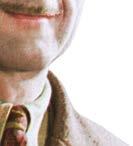
Orwell’s father, Richard Walmesley Blair, worked for the British Empire during British Rule of India (1858-1947).
The scholarship meant that Orwell’s family didn’t have to pay for his education at this school.
He described his family as ‘lower-uppermiddle class’.
In 1914, just before World War I, Orwell became friends with Jacintha Buddicom. When they first met, he was standing on his head in a field. Both of them read and wrote poetry and dreamt about becoming famous writers. Then, between 1917 and 1921, Orwell studied at Eton where he wrote for the college magazine.

Jacintha Buddicom was an English poet and childhood friend of George Orwell.

When Jacintha asked Orwell why he was standing on his head, he said, ‘You are noticed more if you stand on your head than if you are the right way up.’


When talking about his time at Eton, Orwell told Jacintha he was ‘interested and happy’.

6 Dossier
First Job


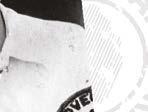



In 1922, Orwell joined the Imperial Police and went to work in Burma where his grandmother still lived. After an illness, he returned to England in 1927 and decided to become a full-time writer.


Orwell used his experience in the Imperial Police to write his first novel, Burmese Days (1934) and the essays A Hanging (1931) and Shooting an Elephant (1936).
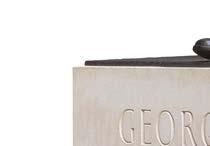


London and Paris

While in London, Orwell lived like a homeless person in the poor parts of the city to learn more about this kind of life. When he moved to Paris in 1928, he lived in a working class area. He became a successful journalist, writing articles for Monde and other newspapers. He used these experiences to write his essay, The Spike (1931) and part of his book, Down and Out in Paris and London (1933). Orwell returned to England in 1930. He wrote for the journal Adelphi and did many low-paid jobs, like working in the fields, in order to continue exploring the life of the poor.



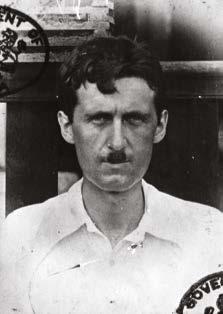
Monde was a weekly, French, international, communist magazine published in Paris from 1928 to 1935.


The Adelphi was an English literary journal that included one or two stories written by famous authors like Katherine Mansfield, D.H. Lawrence and Dylan Thomas.


 The Imperial Police was part of the Indian Police Service during British Rule of India. Burma is now known as Myanmar.
The Imperial Police was part of the Indian Police Service during British Rule of India. Burma is now known as Myanmar.
Teaching
From 1932 to 1935, Orwell taught in London. He also continued writing, and Down and Out in Paris and London was published in 1933. He used this experience as a teacher to write his novel A Clergyman’s Daughter (1935).

Marriage and Social Writing

In 1936, he married Eileen O’Shaughnessy. During this period, Orwell spent time in Northern England to understand the social problems of the working class. He described these later in his book, The Road to Wigan Pier (1937).
Spanish Civil War (1936-39)
From 1936, for 12 years, Orwell was watched carefully by a special unit of the police in London because of what he wrote in The Road to Wigan Pier.
In 1936, Orwell left for Spain to fight with the Republicans against the Nationalists. His wife joined him there shortly after. They finally escaped back to England in 1937, as the Spanish Police wanted to arrest them for belonging to the POUM. After this experience in Spain, Orwell wrote Homage to Catalonia (1938).
The POUM, the Workers’ Party of Marxist Unification, was a Spanish communist political party. During his time in Spain, Orwell saw how bad this kind of authority was, which led him later in life to help the British Foreign Office in anti-communist propaganda activities.

World War II (1939-1945) and Animal Farm









Orwell became part of the Home Guard and kept a wartime diary. In 1941, he wrote: "One could not have a better example of the moral and emotional shallowness of our time, than the fact that we are now all more or less pro Stalin. This disgusting murderer is temporarily on our side, and so the purges, etc., are suddenly forgotten."



Between 1941 and 1943, Orwell worked for the BBC and wrote Animal Farm. He finished Animal Farm in April 1943, but nobody wanted to publish it as it was seen as an attack against the Soviet Regime that was an important ally in the war. Orwell also worked as a war correspondent for the Observer and travelled around Europe.
While he was away on one of his trips, his wife Eileen died. In the end, Animal Farm was published in August 1945 and was an immediate success. Orwell continued to write for various newspapers and magazines as well as starting his most famous book, Nineteen Eighty-Four, which was published in 1949.

Final Years
After his sister Marjorie died in 1946, Orwell went to live in a farmhouse on the Scottish island of Jura where he completed his book Nineteen Eighty-Four. Orwell thought the clean air of Jura would improve his health, but in January 1949, he left the island to see doctors in England and never went back. Around June 1949, he fell in love with Sonia Brownell. She looked after him in hospital in London, where they got married in October 1949. On 21st January 1950, Orwell died at the age of 46.

9
The Home Guard was made up of people who, because of health problems or maybe their age, weren’t able to join the British Army
Barnhill is the name of the farmhouse on Jura, which Orwell rented from 1946 to 1949. It’s still owned by the family that rented it to Orwell.




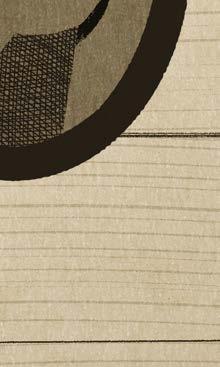


CHARATRS NAPOLEON A lg, iein p w bos t ld o t ams o t fm. SNOWBALL A yn, iein p, fl o bg ia o h t me le bt f t ams. BOXER A he so hs a a hd wk. CLOVER Th md-ad, mhl hs i kd a gt.

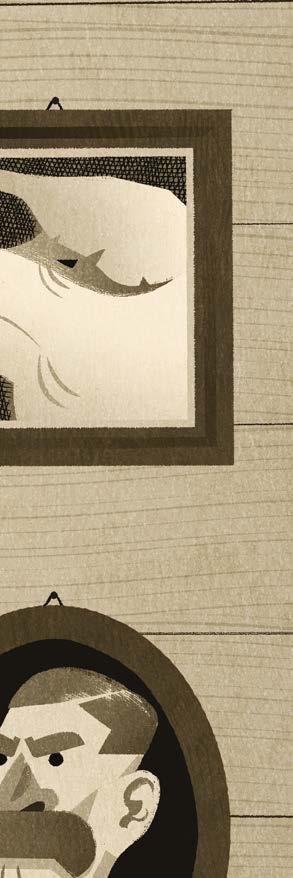
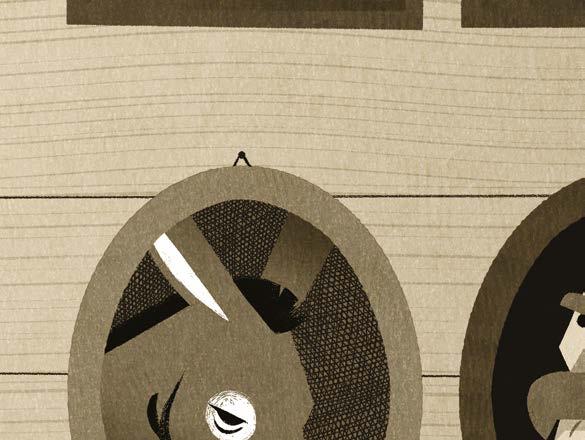




SQUEALER Th yn p i a ga tk. BENJAMIN Th oe am o t fm, h ds’t s mh. OLD MAJOR An iein, o p w h a da o a bt wl f a ams. MR JONES Th oe o Mar Fa.
Vocabulary – Matching
1 Match the words with the definitions.
1 allegory
2 revolution
3 freedom
4 corruption
5 power
6 exploit
Reading
a when people bring down the government of their country
b make full use of something to your own advantage
c dishonest behaviour by those with authority
d control, authority
e a story with a hidden meaning, usually political or moral
f the right to act, speak or think as you want
2 Choose the correct word (A, B, C or D) for each space to complete the text about Animal Farm.
Animal Farm by George Orwell can be considered an allegory of the (1) of the Russian Revolution of 1917 and Stalin’s rule of the Soviet Union. It (2) with the ideas of freedom, rebellion and the corrupting nature of power in general. The novel is about a (3) of animals that takes control of the farm they live on. Mr Jones doesn’t (4) his farm well and drinks so much that he even sometimes forgets to feed his animals. (5) , the animals rebel against their cruel master and Jones has no (6) choice but to run away. Life on the farm is good (7) first, and the animals all hope that they’ll have a happier life with (8) work and more food. Then the pigs, with Napoleon as their leader, start to take advantage of the situation and the other animals soon find themselves under their power.
12 PRE-READING ACTIVITIES
PRELIMINARY
1 A occasion B events C examples D news
2 A deals B involves C talks D has
3 A few B little C group D lots
4 A lead B direct C check D manage
5 A Therefore B However C Meanwhile D Anyway
6 A one B more C other D another
7 A during B in C at D for
8 A least B less C best D most
Matching – Pair Work
3a Animal Farm is set in the English countryside on a farm. Work with a partner and write the correct words under the pictures below.


fence yard straw field barn farmhouse





13
1
4 ___________________ 3
6
2
5
___________________
___________________
___________________
___________________
___________________
Grammar – Passive Forms
3b Complete the sentence below with the words in exercise 3a and the correct passive form of the verbs in the box.
build use keep plant make put
1 Animals usually in the when it’s stormy.
2 Many baskets of
3 That over a hundred years ago. It’s a hotel now.
4 A up last month to stop the sheep from getting out.
5 How many potatoes in that last year?
6 The now as an outside breakfast area.
Writing a Story
4 Write a story. It must begin with this sentence: Staying with my aunt and uncle on their farm was something completely new for me last summer. Write about 100 words.
Speaking – Pair Work
5a Look at the photo and take turns at describing it with a partner. Answer these questions to help you.
1 Where and when was the photo taken?
2 What are the people doing?
3 What’s the weather like?

4 How do you think the people are feeling?
5 What else can you see in the photo?
FINAL TEST PRE-READING ACTIVITIES
PRELIMINARY
5b Discuss the following questions together.
1 What are the advantages and disadvantages of living in a big city?
2 What are the advantages and disadvantages of living in the countryside?
3 Do you like where you live? Why / Why not?
4 Would you like to go and live in another country one day? Why / Why not?
Listening
6 Listen to the start of Chapter 1 and choose the correct answer, A, B, or C.
1 All the animals on Manor Farm
A agreed to meet Mr Jones for a drink.
B dreamt about Old Major.
C had great respect for Old Major.
2 The meeting was
A first thing in the morning.
B in one of the farm buildings.
C before Mr Jones went to bed.
3 At the meeting
A they all waited for Old Major to arrive.
B the cows and sheep sat opposite each other.
C the ducks sat near the two horses.
4 Muriel
A was a white goat. B stood next to the ducks.
C sat beside the hens.
5 Benjamin
A really liked Boxer. B was always in a bad mood.
C talked all the time.
6 Mollie
A was very intelligent. B liked sugar.
C came in after the cat.
15
PRELIMINARY 21st Century Skills
2
Old Major is a white pig that has had a good life and has won many prizes in farm competitions.
Manor Farm, somewhere in the English countryside, represents Russia and, in general, European countries ruled by Capitalists.
Mr Jones, the owner of Manor Farm, is a lazy, drunken* farmer who’s unkind to his animals. He represents Tsar Nicholas II.
The word ‘comrade’ meaning ‘friend’ is often used when talking of Communism and the Soviet Union, so this word already tells us about Old Major’s ideals.
Chapter 1 Old Major
One night, Old Major had a strange dream. The next morning, he asked the other animals to meet him in the barn that night. All the animals on Manor Farm respected Old Major so, once Mr Jones was in bed, all the animals met in the barn as agreed. The pigs sat at the front with the sheep and cows behind them. Then, there were the two horses, Boxer and Clover, and the ducks, while the hens sat at the window. Behind the horses, there was Muriel, the white goat, and Benjamin, the donkey. Benjamin never said much, but he was very fond of strong, gentle Boxer and they usually spent their Sundays together. Mollie, a silly white horse, came in eating a lump* of sugar, followed by the cat. Only Moses, Mr Jones’s pet raven*, didn’t come to the meeting.
drunken under the influence of alcohol lump (here) a small cube (of sugar) raven a large black bird

16
‘Comrades,’ said Old Major, ‘I’ve had a long life and before I die, I want to tell you what I’ve learned about the way we animals live.
2 3
Old Major is ready to make his speech.

Old
What are our lives like? I’ll tell you. Our lives are miserable and short, working hard every day until we’re slaughtered*. No animal in England knows what it means to be free and happy. We’re like poor, miserable slaves*, given just enough food to keep us alive. However, it doesn’t have to be like this. The English countryside is rich and fertile and the weather is good. This farm alone could grow enough to feed 12 horses, 20 cows, hundreds of sheep – and all of them living comfortably. It’s Man who steals everything from us without giving anything back. We give human beings our milk and eggs. We work hard in the fields while Man can’t even run fast enough to catch a rabbit! Our young are taken away from us and never seen again! It’s clear then, comrades, that we must get rid of* Man so that everything we make will belong to us and we’ll become rich and free! Therefore, my message to you is Rebellion! It might take a week or a hundred years, but sooner or later, it’ll happen. Therefore, comrades, think of this for the rest of your short lives, and above all, pass on this message to those who come after you, so that in the end we’ll win! Remember, all men are enemies. All animals are comrades.’
All the animals started shouting excitedly.
slaughter kill (animals) for food slave a person who’s owned by someone else and has to work for them without being paid get rid of take action so you can be free of an unwanted person or thing
18 George Orwell Animal Farm
‘Remember,’ continued Old Major, ‘that whatever goes on two legs is an enemy. Whatever goes on four
Major’s words remind the reader of both Karl Marx, a German economist, and Vladimir Lenin, a leader of the Russian Revolution.
The word Rebellion reminds us of the Russian Revolution of 1917, when the Russians got rid of their ruling Royal family.
legs, or has wings, is a friend. What’s more, we must never become like Man. No animal must ever live in a house, or sleep in a bed, or wear clothes, or drink alcohol, or smoke, or touch money, or do business. Above all, no animal must ever be cruel to or kill any other animal. All animals are equal!’
After telling them about his dream the night before of a world free of Man, Old Major began to sing an old song from his childhood called “Beasts of England”. The song was about the wonderful future for all animals after the Revolution. By the end of it, the pigs and dogs already remembered the words, while even the stupidest animals soon learnt the tune*. They were so excited that they sang it five times.
Old Major died in his sleep three nights later and his body was buried in the orchard*. It was now March and over the next three months, the pigs, who everyone agreed were the cleverest, felt it their duty to prepare the other animals for the Rebellion.
Among the pigs, there were two young boars* called Snowball and Napoleon. Napoleon was large and angry-looking and he usually got what he wanted. Snowball was livelier than Napoleon, better at speaking, and was full of ideas.
The song ‘Beasts of England’ represents the socialist anthem “The Internationale” and is full of hope for a better life after the Revolution.
tune melody orchard a piece of land planted with fruit trees boar male pig
Snowball and Napoleon represent Communist Party leaders: Napoleon is based on the Soviet dictator, Joseph Stalin, while Snowball is based on Leon Trotsky who was against Stalin.
19
Chapter 1 Old Major
Squealer represents the journalists who wrote for a Soviet newspaper called Pravda during Stalin’s rule. This newspaper was full of propaganda in Stalin’s favour.
Squealer has great power over the animals with his clever use of language.
However, Snowball wasn’t as strong a character as Napoleon. Then, there was Squealer, a small fat pig, who was such a brilliant talker that he could make the other animals believe anything he said. Indeed, the animals said that Squealer could turn black into white.
Napoleon, Snowball and Squealer decided to call Old Major’s teachings ‘Animalism’. Several nights a week, they taught the other animals the principles* of Animalism in the barn. At first, some of the animals felt it their duty to be loyal* to Mr Jones. Others didn’t care because they didn’t think the Revolution was going to happen while they were still alive.
principle idea, theory loyal showing you trust someone

20
Mollie was the worst and asked stupid questions like: ’Will there still be sugar after the Rebellion?’
‘No,’ said Snowball. ‘We have no way of making sugar on this farm and anyway, you don’t need it. You’ll have plenty of other things to eat.’
Mr Jones’s pet raven, Moses, was also a problem for the pigs. He was a clever talker and told the animals a lot of lies about a place called Sugarcandy Mountain, where all animals went when they died. He said that it was in the sky above the clouds. In this place, every day was like a Sunday, sugar lumps grew on the trees, and it was always nice and warm. The animals hated Moses because he didn’t work and was seen as Mr Jones’s spy*. However, the pigs had to argue very hard to persuade them that there was no such place as Sugarcandy Mountain.
The easiest animals for the pigs to persuade were the two horses, Boxer and Clover. They weren’t good at thinking things out for themselves so they totally accepted the pigs as their teachers. They listened carefully to everything they were told and, in their simple way, they passed this information on to the other animals. They never missed the secret meetings in the barn and were always the first to start ‘Beasts of England’ at the end of each meeting.
spy a secret agent who gets information about an enemy
21
Chapter 1 Old Major
Moses the raven represents the Russian Orthodox Church. Sugarcandy Mountain is like Heaven for the animals.
Old Major’s grave.
Boxer and Clover represent the working class.
Reading Comprehension – True or False
1 Read the sentences about Chapter 1 and decide if they’re true (T) or false (F). Correct the false ones.
1 The animals are annoyed about having to go to the meeting in the barn.
2 Benjamin’s best friend is a horse called Boxer.
3 Old Major talks to the animals about the good life he’s had.
4 He says the animals’ greatest enemy is Man.
5 He warns the animals that it’s too dangerous to rebel.
6 He says that one day the animals can hope to become like Man.
7 Old Major is killed three nights later.
Vocabulary
2 Complete the sentences about Chapter 1 with a word from the box.
loyal alive principles orchard raven comrades drunk
1 Mr Jones was in bed as usual.
2 Moses was Mr Jones’s pet .
3 The animals were given just enough food to keep them .
4 Old Major said all animals were .
5 The pigs taught the others the of Animalism.
6 Old Major was buried in the .
7 Some of the animals felt they had to be to Mr Jones.
22 CHECK IT OUT
T F
Modal Verbs
1 Complete the sentences from Chapter 1 with the verbs from the box.
will could had to shouldn’t must might can’t mustn’t
1 There’s no reason why we animals have lots to eat.
2 This farm alone grow enough to feed 12 horses.
3 Man even run fast enough to catch a rabbit.
4 We get rid of Man.
5 We become rich and free.
6 We become like Man.
7 The rebellion be in a week or in a hundred years.
8 The pigs argue hard to persuade the animals that there was no such place as Sugarcandy Mountain.
Verb Patterns
2 Choose the correct alternative to complete the sentences.
1 Old Major asked the other animals come / to come to the barn.
2 The animals agreed to meet / meeting that night.
3 Old Major wanted to talk / talk to the animals about the Rebellion.
4 No animal in England knew what it meant be / to be free.
5 All the animals started shout / shouting excitedly.
6 Old Major’s dream made him remembering / remember an old song.
7 The pigs decided teach / to teach the other animals about Animalism.
23 DEVELOPING CRITICAL THINKING SPOT ON GRAMMAR
Listening




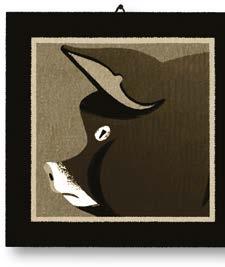

4 Listen to the start of Chapter 2. First you will have 1 minute to study the task below, then you will hear the recording twice. While listening, match the beginning of the sentences (1-5) with the sentence endings (A-H). There are two sentence endings that you should not use. The first one (0) has been done for you. After the second listening, you will have 1 minute to check your answers.



0 C It didn’t take long before
1 All Mr Jones did was
2 Mr Jones’s men
3 One Saturday, Mr Jones went to town
4 When he came back, he
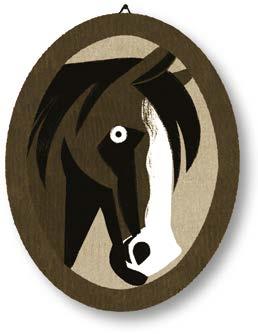
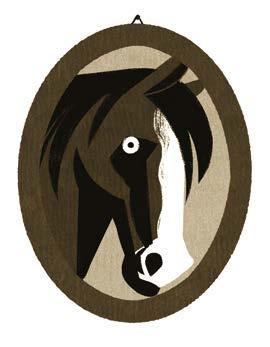
5 The animals were so hungry
A and stayed out all night
B sleeping on the sofa all day long
C the animals decided to rebel
D didn’t feed his animals immediately
E keeping the fields free of weeds.
F read and get drunk
G that they broke into the store-shed
H weren’t honest hard workers
24 FOCUS ON YOUR EXAMS
INVALSI
Online Research – Pair Work



1 In Animal Farm, Mr Jones represents Tsar Nicholas II. Search on the Internet with a partner and answer the questions below.
1 What was the Tsar’s full name?
2 When was he born?

3 What name is he known by in the Russian Orthodox Church?
4 When did he become Emperor of Russia?
5 Which dynasty did he belong to?
6 How did the First World War contribute to him being unpopular among his people?





7 When did he abdicate for himself and his son?
8 Where were he and his family exiled to?
9 When were he and his family killed?
Writing
2 Write a paragraph (about 100 words) about Umberto II, the last king of Italy. Compare the information with your answers about Tsar Nicholas II in exercise 1 and discuss with your partner how similar / different their lives were.

25 THINK ON!
____________________________________________________________________ ____________________________________________________________________ ____________________________________________________________________ ____________________________________________________________________ ____________________________________________________________________ ____________________________________________________________________
21st
Technology Skills
Century Skills
Willingdon is a real town in East Sussex, England and The Red Lion Inn is a real pub there.
Drawing room is an old-fashioned word for living room, where people with big houses entertained their guests.
The News of the World was a weekly national newspaper published every Sunday in the United Kingdom from 1843 to 2011. Its articles were always full of gossip about famous people.
Chapter 2 The Rebellion

The Rebellion happened earlier than expected. The farm wasn’t going well, and the more money Mr Jones lost, the more he drank. He spent his days doing nothing except reading the newspaper and drinking. His farmworkers weren’t any better. They were lazy and dishonest, so the fields were full of weeds* and the animals weren’t fed enough.
One Saturday in June, Mr Jones went to the Red Lion in Willingdon. He got so drunk that he didn’t come back until midday on Sunday. Instead of feeding his animals, he fell asleep on the sofa in his drawing room with the News of the World over his face. By the time evening came, the animals were starving* and couldn’t stand it any longer. They broke down the store-shed* door and began eating the food kept in the bins.
Suddenly, Mr Jones woke up and rushed* to the shed with his men. The men began hitting the animals with their whips*. This was too much for the hungry animals.
weed a wild plant growing where it’s not wanted starving dying from hunger store-shed a farm building where things are kept rush run whip
26
4 5
They attacked the men, kicking and pushing them with their horns*. Jones and his men were so surprised that they soon gave up and ran away.
At first, the animals couldn’t believe it. Manor Farm was theirs! They made a big fire in the yard and burnt the whips and everything else that reminded them of Jones. Snowball also burnt the ribbons* usually worn by the horses on market day.
‘Ribbons,’ he said, ‘are like clothes. No animal should ever wear clothes like humans.’
On hearing this, Boxer even burnt the little straw hat he usually wore to keep the flies away.
Next, Napoleon gave them twice as much food as they usually got. Then, they sang ‘Beasts of England’ seven times and finally settled down* happily for the night.
Next morning, they could hardly believe that everything they saw was now theirs, but when they got to the farmhouse, they were too frightened to enter. After a moment, Snowball and Napoleon pushed the door open and the animals followed them inside. They walked around the house slowly, frightened to touch anything. They were amazed by how beautiful everything was: the comfortable beds, the soft carpets, the mirrors, everything!
horn ribbon settle down become quiet and calm
27
Chapter 2 The Rebellion
The farmhouse represents the human way of life, which is much better than that of the animals.
Mollie is the only animal that seems to miss a human master, who gave her sugar and let her wear ribbons.
Upstairs, Mollie found some ribbons and stood admiring* herself in the mirror. She stopped when she saw how angry they all were with her.
They took the hams hanging in the kitchen out to be buried. Then, with one strong kick, Boxer broke the barrel* of beer in the kitchen. That was all they touched. They all agreed that no animal should ever live in the farmhouse.
The fact that the pigs can read and write gives them a big advantage over the other animals. The seven commandments represent the central beliefs of Animalism, which come from Old Major’s idea that all animals should be free and equal.
After breakfast, the animals were very surprised when Snowball said: ‘Comrades, over the last three months, we pigs have learnt to read and write from some old books that Jones had.’
Napoleon then led them all to the farm gate where Snowball painted the words: ANIMAL FARM. This was to be the name of the farm from now on. Back at the barn, Snowball said: ‘We’ve studied Animalism carefully. Now we’re going to write seven commandments on the barn wall, which describe it perfectly. From now on, all the animals on Animal Farm will live by these commandments.’
Snowball then painted the seven commandments in big letters on the outside of the barn wall. He read them to the other animals and they all agreed with them. Only the cows seemed a bit uneasy* but it wasn’t because of the commandments; they needed milking*.
admire respect, think highly of barrel uneasy feeling worried, uncomfortable milk (verb) draw milk from a cow (here) by hand

28
George Orwell Animal Farm
The Seven Commandments of Animalism
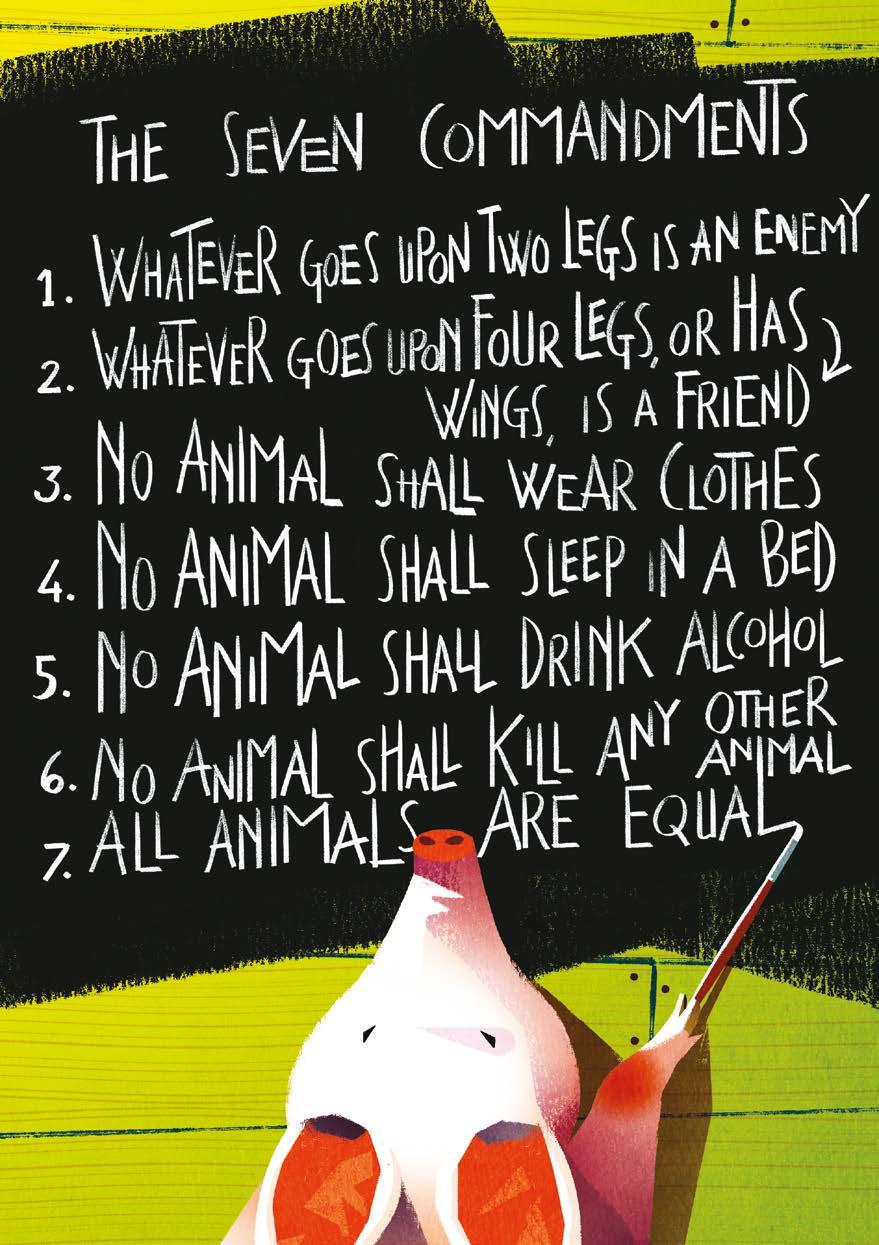
The flag is green like the fields of England, while the hoof and horn represent the animals.
The pigs came to the rescue and milked them. Soon, there were five buckets of fresh milk.
‘What’s going to happen to all that milk?’ said someone.
‘Never mind the milk, comrades!’ cried Napoleon. ‘The harvest* is more important. Back to work everyone! I’ll follow in a few minutes.’
When the animals came back in the evening, there was no milk to be seen.
The pigs didn’t actually work, but they were very clever at solving problems. With their greater knowledge, it was natural that they should be the leaders. Boxer was the strongest and the hardest worker, getting up earlier than all the others so he could do all his work. However, despite the hard work, all the animals were happy except Benjamin, who didn’t see any change.
On Sundays, instead of working, they put up their flag* - green with a white hoof* and a horn – and then had a meeting in the barn. The pigs always decided everything, but Napoleon and Snowball never agreed with each other. To finish, they all sang ‘Beasts of England’. The pigs could read and write much better than the other animals and every day, they learnt new skills*. To help the other animals, Snowball said that harvest when you pick things like vegetables once they’ve grown flag hoof a horse’s foot skill ability
30 George Orwell Animal Farm
all they had to remember was ‘Four legs good, two legs bad.’ Soon, the sheep were bleating* these words for hours on end*.
Napoleon was more interested in the young animals than educating the older ones. When the dogs had nine puppies, he took them away from their mothers to educate them himself. He kept them in a loft* away from the other animals, who soon forgot about them.

The animals soon discovered that the milk was mixed* every day into the pigs’ food. All the apples on the ground in the orchard were also only for the pigs. For once, Snowball and Napoleon both agreed on this, and they sent Squealer to explain why to the others.
‘Comrades!’ cried Squealer. ‘I hope you don’t think we pigs are being selfish. Most of us don’t even like milk and apples, but we need them to think well. We’re the brains behind the farm. If we fail our duty, then Jones will come back!’
On hearing this, they all agreed that the milk and apples should be for the pigs alone.
bleat the noise sheep make for hours on end for hours and hours without stopping loft a room or space directly under the roof of a building mix put together to form one thing
The animals are so frightened at the thought of Jones coming back, that they let the pigs take all the milk and apples.
Chapter 2 The Rebellion
Napoleon with the puppies.
Reading Comprehension
1 Answer the questions about Chapter 2.
1 How did Mr Jones manage his farm?
2 Why did the animals break into the store-shed?
3 Why did Boxer throw his hat onto the fire in the yard?
4 What were the animals surprised by on entering the house?
5 What did Benjamin think of the new situation?
6 What happened when some puppies were born?
7 What happened to the milk and apples?
Speaking – Pair Work
2 Look again at the seven commandments and discuss the following questions with a partner.
1 Which do you think is the most important commandment? Why?
2 Why do the pigs think the animals need the seven commandments?

3 What do the seven commandments represent?
4 The last commandment
‘All animals are equal’ is already broken in Chapter 2. When?
5 What is the song ‘Beasts of England’ about?
32 CHECK IT OUT
Grammar – Past Simple

1 Complete the sentences about Chapter 2 with the past simple form of the verbs in the box.
be run lose sing fall make begin find give drink
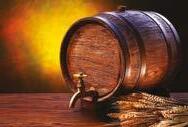
1 The more money Jones , the more he .
2 Jones asleep on the sofa in his drawing room.
3 The men hitting the animals with their whips.
4 Jones and his men up and away.
5 The animals a big fire in the yard.
6 Mollie some ribbons upstairs in the farmhouse.
7 The pigs clever at solving problems.
8 At the end of every meeting, they always ‘Beasts of England’.
Vocabulary and Writing

2 Match the characters to the pictures and use them to write sentences about Chapter 2.
1 Snowball
2 Napoleon
3 Boxer
4 Mr Jones

33 DEVELOPING CRITICAL THINKING SPOT ON GRAMMAR
a c b d
Listening
Listen to the start of Chapter 3 and choose the correct answer, A, B or C.
1 How did the animals on other farms find out about the Rebellion?
A Snowball and Napoleon told them.
B The birds from Animal Farm told them.
C Their owners told them.
2 What did Jones do?
A He sat in the pub all day long.
B He took advantage of the situation to help the other farmers.
C He said he was sorry about the situation to the other farmers.
3 Foxwood Farm
A was smaller than Pinchfield Farm.
B wasn’t very modern.
C belonged to Mr Frederick.
4 Mr Frederick
A was very pleasant.
B liked fishing.
C looked after his farm better than Mr Pilkington.
5 Mr Frederick and Mr Pilkington
A always had the same opinion about everything.
B didn’t get on well at all.
C found out about the Rebellion from their animals.
6 The two farmers said that
A the animals on Manor Farm were dying of hunger.
B the Rebellion was just a wild story.
C the animals were eating each other’s food.
34 FOCUS ON YOUR EXAMS
PRELIMINARY 6
The 2030 Agenda Goal 4: Quality Education




Writing

1 In Chapter 2, the author shows us how much power the pigs have over the other animals because they can read and write better. This shows us how important it is to have a good education, so as not to be at a disadvantage. Work with a partner and complete these sentences about some of the points included in Goal 4 of the 2030 Agenda with the words in the box.
access further ensure training count increase


1 that all girls and boys complete free and quality primary and secondary education.
2 Give all children to quality early childhood development, care and pre-primary education so that they are ready for school.
3 the number of teenagers and adults with good technical skills.
4 Give everyone the same opportunities for education, including university, without it being limited only to rich people.
5 All young people and most adults should be able to read, write and by 2030.
6 Develop teacher programmes in poor countries where there aren’t enough teachers.
Speaking – Pair Work

2 Discuss these questions with a partner.
1 Why did you choose to go to the school you’re attending now?
2 Which subjects do you think are the most useful for what you want to do in the future?
3 Which subjects would you prefer not to study? Why?
4 What do you think makes a good teacher?
35 THINK ON!
Reading Comprehension – True or False

1 Read the sentences about Chapter 8 and decide if they’re true (T) or false (F). Correct the false ones.
1 Clover retired when she reached the age of fourteen.
2 Both the farm and all the animals were much richer than before.
3 Benjamin believed that nothing ever changed.
4 The Seven Commandments were no longer written on the barn wall.
5 The pigs gave the animals magazines to read.
6 Napoleon bought some clothes for himself in town.
7 The farmers who visited Animal Farm admired the pigs’ way of managing the other animals.
Writing a Letter
2 Imagine you’re Mr Pilkington. Write a letter to another farmer telling him about your visit to Animal Farm. In your letter:
• tell him what you saw and liked
• tell him what changes you saw in the pigs
• say what ideas from Animal Farm you’d like to use on your farm




Write about 100 words.

100 CHECK IT OUT
T F
Gap Fill
1 Complete this part of Chapter 8 with one word for each space. The animals outside gazed at the scene and noticed (1) strange about the pigs, but didn’t know exactly (2) it was. As they were slowly walking away from the house, the animals suddenly heard loud, angry voices from inside. They rushed (3) to see what was happening. Inside, they (4) arguing over a card game. Napoleon and Pilkington both had the (5) card. The strange thing was that the twelve voices (6) sounded the same to the animals outside. Clover and the others looked from pig to man and from man to pig, but already it was impossible to say which was which.
Vocabulary
2 Choose the correct alternative to complete the sentences.
1 Napoleon weighed twenty-four stones / stone
2 Squealer was so / such fat that he could hardly see out of his eyes.
3 Nobody apart / except Benjamin could remember what the farm was like before.
4 Squealer kept / held the sheep isolated for a week.
5 The animals heard the terrified bleating / neighing of a horse.
6 The animals on Animal Farm got least / less food than the ones on Mr. Pilkington’s farm.
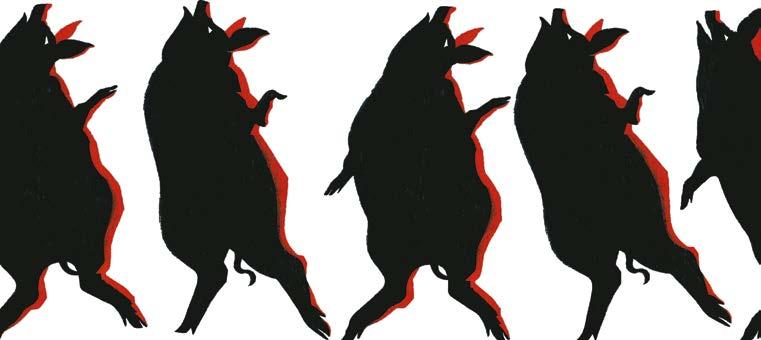
CRITICAL THINKING
DEVELOPING
SPOT ON GRAMMAR
Reading
Read the text about the animated film version of Animal Farm. Parts of the text have been removed. Choose the correct part (A-J) for each gap (1-7). There are two extra parts that you should not use. The first one (0) has been done for you.
Animal Farm – Animated Film Version
The 1954 animated version of Animal Farm was based on George Orwell’s 1945 novel. It wasn’t an animated film for children (0) , as its message was political. The film wasn’t very successful, but in the 1980s, (1) as well as other English-speaking countries like Canada, Australia and New Zealand. However, this animated version did not respect the full message behind Orwell’s novel (2) , whose politics made them rich while making the lower class suffer.
After George Orwell died in 1949, (3) and bought the film rights of the book from her. Orwell’s wife didn’t realise that these people were also secret CIA agents, whose job was to protect the security of the US. At that time, the CIA was financing art to (4) as this was the period of the Cold War, when there was great tension between the Soviet Union and the United States. Many people in the US (5) in what is known as the Red Scare. There was even a ‘Hollywood blacklist’. This was a list of the names of any actors, directors, musicians and others in the entertainment business (6) . If your name was on this list, nobody wanted to employ you.
The film was produced in London and the original ending was changed. In the animated version, the other animals successfully revolt against the pigs (7) and kill Napoleon.
A against both Communist and Capitalist leaders
B fighting against Communist ideas
C were often wrongly accused of being communists
D but was made for a more adult audience
E who were thought to be in favour of communism
F a film company got in touch with his wife
G was terrified of meeting a communist
H it was widely used in schools in the United Kingdom and the United States
I at the end of the story
J produce anti-communist propaganda
102 FOCUS ON YOUR EXAMS
INVALSI D
Speaking and Writing – Pair Work
Discuss these sentences from the story with a partner and write your answers.
1 ‘The three new horses were great workers but very stupid.’
Why did the pigs buy stupid animals to work on Animal Farm?
2 ‘The pigs spent hours filling sheets and sheets of paper with figures. Once completed, they were then burnt for the welfare of the farm.’
Why did the pigs burn everything?
3 ‘Even so, the animals still felt honoured to be members of Animal Farm, the only one of its kind in the whole of England.’
Do you find it easy to understand why the animals feel like this? Why? / Why not?
4 ‘No animal among them ever walked on two legs.’




Why is this sentence so ironic?

5 ‘Napoleon also walked on his hind legs with a whip in his trotter.’
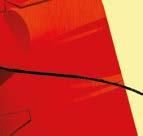

Why is the fact that Napoleon has a whip so significant?
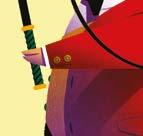

6 ‘You pigs have to contend with lower animals, while we humans have our lower classes!’
What is Orwell trying to tell the reader with this sentence?

7 ‘Napoleon and Pilkington were both holding the same card.’
What does this tell us about these characters?

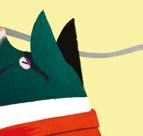
THINK ON!
21st Century Skills Analytical Thinking
Speaking and Writing
1 Read the original Seven Commandments written by the pigs on the barn wall. Discuss the following questions with a partner and write your answers.

a What sentence did Snowball suggest the animals should learn rather than trying to remember all seven commandments? How did Napoleon make use of this sentence to his advantage?
b During the story, the pigs changed the words of some of the original commandments. Say which ones, how they were changed, and why.
c What new song does Squealer teach the sheep? Explain why, and which two commandments are broken by these new words.
104 FINAL TEST
Reading – Matching
2 Match these quotes from the story to the character.
1 ‘Napoleon is always right.’
2 ‘If that’s what’s written on the wall, it must be right.’
3 ‘I’m sure none of you wants to see Jones back.’
4 ‘Quick, quick! They’re taking Boxer away!’
5 ‘Remember, all men are enemies. All animals are comrades.’
6 ‘The only good human being is a dead one.’
7 ‘So gentlemen, please raise your glasses to Manor Farm!’
Speaking – Pair Work
a Napoleon
b Benjamin
c Boxer
d Snowball
e Squealer
f Clover
g Old Major
3 Your friend Susan is a primary teacher and is organising a trip for her students, aged seven, to visit a farm. Here are some activities that the children can do on the farm.


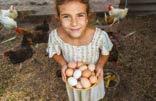

Talk to your partner about the different activities the children could do and decide which would be the most enjoyable.



105 PRELIMINARY
Reading
4 The people below all want to spend the day somewhere in the English countryside. Read the descriptions of eight places they could visit. Decide which place would be most suitable for each person.
1 Brian is a computer programmer so he spends many hours indoors. He’d like to find somewhere to enjoy an energetic walk in the fresh air. He’s very fit and would also like to see something interesting while walking.
2 Jane wants to give her twin boys a special treat for their birthday. They both love doing exciting things outdoors, but she also wants a place where she can chill out and maybe catch sight of some birds or animals.
3 Clare and Sam don’t have a car, but they’d like to spend a day walking in the countryside and then maybe go for something nice to eat once they’ve finished their walk in the fresh air.
4 Joe and Sally want to take their grandchildren, Zoe 3 and Tommy 12, away for the day. They need somewhere safe for Zoe to play. Tommy wants to bring his bike and go riding with his grandpa, while Sally would rather sit with a nice cup of tea and watch Zoe play.
5 Brian wants to go somewhere where he can try different water sports and be surrounded by nature. He wants a place with a lot of action so that he can also meet young people like himself.
A Wendover Woods
There’s something for everyone in these woods which also offer fantastic views across the Chiltern Hills. It’s easy to reach by car, and there’s a café with a children’s play area next to it. You can do a wide variety of activities in the woods including horse-riding and cycling.
B Stanage Edge
It takes just 20 minutes by car to reach this rocky area, which offers fantastic views of the Peak District. This is the ideal place for fit and healthy people who love mountain biking and rock climbing. You can also visit 16th century North Less Hall.
106 FINAL TEST PRELIMINARY
C Nene Park
If you’re looking for a beautiful, peaceful place with grasslands, lakes and woodland, this area is the place for you. Enjoy a long walk along the River Nene or try out rowing on the lake. There are also many great cycling paths here and even a golf course.
D Delamere Forest
Here you can get rid of stress and Go Ape at the outdoor adventure park in the forest. If you prefer, you can simply relax, watching the wildlife on the lake, so there’s something for everyone. There are also many easy trails if you fancy a walk.
E Walking in the Cotswolds
Make sure you have a good pair of walking boots and that you’re fit enough for this 11 mile walk in the countryside between Bourton-onthe-Water and the village of Slaughters. An old Roman road is also part of the route you’ll walk along.
F Lyme Park, Cheshire
If you like a challenge, then this 35-mile trail is exactly what you’re looking for. Enjoy lots of breathtaking views across the Cheshire Plain as well as the chance of seeing interesting monuments and buildings along the way.
G The National Forest
Of course, the National Forest is full of trees but that’s not all. You can enjoy canoeing or rowing along canals and rivers, or maybe you’d rather do some windsurfing on the many reservoirs and lakes. It’s a place that attracts a wide variety of people of different ages but especially young people who find it a great way to have fun and socialise at the same time.
H The Sandstone Trail
All you need is good walking boots to follow this trail that will leave you feeling strong and healthy. The walk starts in the town of Frodsham and finishes in Whitchurch, which is great for all those using public transport. Both towns also offer lots of delicious eating places.
107
5 Discuss the following questions with your partner, giving reasons for your answers.
1 How important do you think Educational Farms are?
2 How often does your school organise class trips?
3 Do you think you can learn more from class trips than a normal lesson?
4 Where did you go on your last school trip? Did you enjoy it?
5 Do you think it’s better to organise school trips to places in Italy or abroad?
6 Where would you like to go on your next school trip?
Speaking – Short Presentation
6 Prepare a short oral presentation explaining how important it is for all of us to have a good education. Use the ideas below to help you.
• Talk about the skills we all need to do normal things in life like shopping for food
• Talk about education and finding a good job
• Say what is meant by: ‘Education isn’t just what you learn at school.’
• Say why you agree or disagree with the statement above.
Writing
7 Answer the following question.
How can Animal Farm be considered a fable? Give reasons for your answer.
108 FINAL TEST
21st Century Skills
Internet Research – Famous Women



8 Search on the internet for more information about these women who are all famous for fighting for some form of equality. Match the pictures with their names in the box and the correct description below.
Sally Ride Malala Yousafzai Dolores Huerta

a The first American woman to fly in space, she encouraged young women to study for jobs in the fields of science and engineering.

b She’s a young social activist, fighting for the right for girls to have an education.
c She’s a civil rights activist and fights especially for the rights of farmers and farmworkers


PowerPoint – Presentation

9 Prepare a PowerPoint presentation on one of the women in exercise 8. In your presentation, you should:

• talk about her origins and life
• explain her beliefs and goals

• explain the historical impact of this woman

1 ______________ 2 ______________ 3 ______________
Boxer’s last days
Scene: In Boxer’s stall after he’s fallen











Clover: Look Boxer, Benjamin and I have prepared a nice soft bed of straw for you. You’ll feel better once you’ve had a good sleep.
Benjamin: Yes, don’t worry about a thing, old friend. I’ll stay here and keep the flies off you with my tail.
Boxer: Thank you. You’ve always been such good friends to me. I just wish I could see the windmill finished.
Benjamin: Never mind about that stupid windmill. Look what the windmill has done to you! You’ve always worked too hard and for what? To make the pigs fatter while we all starve to death? Look at how thin you are, Boxer!
Clover: Shh Benjamin! Squealer’s coming with the dogs…. (Squealer enters with two of the fierce dogs)
Squealer: Comrade Boxer, I can’t begin to describe how dismayed Napoleon was to hear about your terrible accident. He’s already spoken to Mr Whymper who’s arranging for you to see the vet this week in town.
Clover: Do you mean, you’re going to put him into the hands of a human being? I don’t like the sound of that, Comrade Squealer.
Boxer: Don’t worry, Clover. Comrade Napoleon is always right. If he thinks I should see the vet, then I’ll go. I trust our leader completely. (Benjamin says nothing but his tail is moving back and forwards so quickly, it seems he’s trying to fight off thousands of flies.)
Squealer: That’s the right spirit, Comrade Boxer. All the animals should be as loyal as you are after all that our great leader Napoleon has done for us. To show you how much he cares, he’s also given me this bottle of pink medicine for you. Take it twice a day, Now, I’ll leave you to rest. Goodnight comrades!
(Exit Squealer and dogs)
110 DRAMA
Boxer: See, Benjamin, you’re wrong. Our leader Napoleon is so kind that he’s even given me some medicine to take. When did Jones ever give us any medicine? Never!
Clover: Right, well let’s not argue Boxer. It’s not good for you. You need to rest…
Boxer: I know, I know, and I don’t want to argue with you, my old friend Benjamin. We’ve known each other for longer than I can remember. I really was looking forward to retiring with you my dear friend, but I don’t know now if…

Benjamin: Of course, we’ll retire together! What are you talking about? Just think about getting better and then in a few months, we’ll be together in the field with the warm sunshine on our backs and nothing to do except keep the flies off us with our tails.
Clover: Yes, and I’ll pass by between one job and another to have a little chat until the day I retire too.



Boxer: Oh, it sounds wonderful! I couldn’t dream of anything better, except maybe Sugarcandy Mountain. Do you think Moses is right? Does it really exist?
Benjamin: You know my feelings on that one, Boxer. We’ve talked about it many times before. For me, it’s just a stupid invention to make us work harder, an empty promise that’s all.
(Clover looks at Benjamin)





Clover: (angrily) I don’t want to hear another word about Sugarcandy Mountain! (kindly) Wait and see Boxer. That vet in town will soon make you better.
Boxer: Oh Clover, I feel a bit afraid about going to the vet’s, as if something bad is about to happen.
Clover: Don’t be silly. Didn’t you say yourself that Napoleon is always right? Let’s get some of this medicine into you and after a good night’s sleep, you’ll feel much better.

111
MY BOOK
My favourite character is because ____________________________________________________________________
My favourite scene in the book is when ___________________________________
What I really don’t like about the book is because ____________________________________________________________________
I like/don’t like the story because ____________________________________________
Points to remember about the book are __________________________________

eliGreenwich
STAGE 1 A2 KEY
STAGE 2 B1.1 PREPARING FOR PRELIMINARY
STAGE 3 B1.2 PRELIMINARY
STAGE 4 B2.1 PREPARING FOR FIRST
STAGE 5 B2.2 FIRST
e animals of Manor Farm rebel against their cruel owner Mr Jones and decide to manage the farm themselves, renaming it ‘Animal Farm’. For a short time, they enjoy the freedom and even the pleasure of working for themselves. However, it becomes evident that the animals aren’t all as equal as they imagined, and they soon nd themselves under the control of Napoleon and the other pigs. rough this novella, George Orwell highlights the corruption and abuse of political power.
George Orwell
Eric Arthur Blair is better known by his pen name, George Orwell. He was a novelist, essayist, journalist and critic and is considered one of Britain’s greatest writers. In his works, he criticises any kind of political regime with a dictator and strongly supports political democracy. Born in India in 1903, he was then brought up and educated in England. After working in Burma as an imperial police o cer, he returned to England to concentrate on his writing. His most famous works are Animal Farm, a short allegorical novel, and Nineteen Eighty-Four, a dystopian social science ction novel.
FLIP BOOK
WITH SMARTPHONE OR TABLET
• Download the app
• Use the ELILINK app
• Scan the cover

WITH PC OR MAC Download Audio from www.gruppoeli.it
www.eligreenwich.it



www.gruppoeli.it




DIGITAL AND INTERACTIVE VERSION OF THE BOOK (LOOK AT THE INSIDE FRONT COVER FLAP)
€ 9,80
AUDIO MP3
ELIs.r.l. ANIMALFARM 978-88-536-3976-9 Questo volume sprovvisto del talloncino è da considerarsi CAMPIONE GRATUITO fuori campo IVA (Art. 2, c. 3, I.d, DPR 633/1972 e Art. 4, n.6, DPR 627/1978)
































































































































































